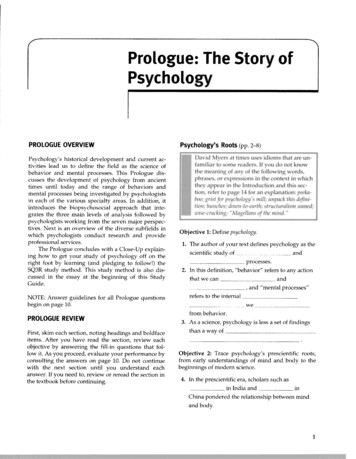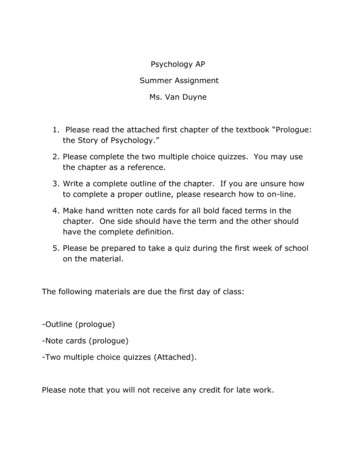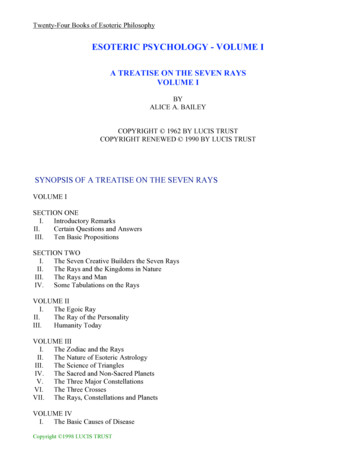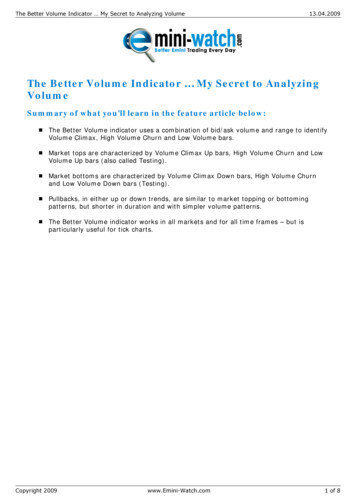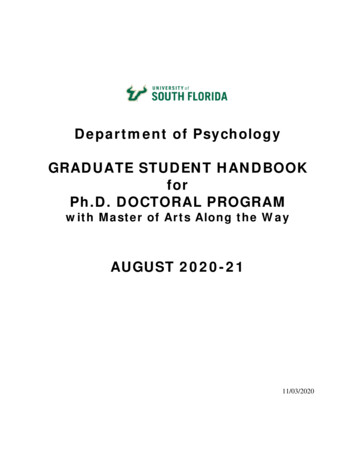
Transcription
HANDBOOKofPSYCHOLOGYVOLUME 4EXPERIMENTAL PSYCHOLOGYAlice F. HealyRobert W. ProctorVolume EditorsIrving B. WeinerEditor-in-ChiefJohn Wiley & Sons, Inc.
HANDBOOKofPSYCHOLOGY
HANDBOOKofPSYCHOLOGYVOLUME 4EXPERIMENTAL PSYCHOLOGYAlice F. HealyRobert W. ProctorVolume EditorsIrving B. WeinerEditor-in-ChiefJohn Wiley & Sons, Inc.
➇This book is printed on acid-free paper.Copyright 2003 by John Wiley & Sons, Inc., Hoboken, New Jersey. All rights reserved.Published simultaneously in Canada.No part of this publication may be reproduced, stored in a retrieval system, or transmitted in any form or by any means, electronic,mechanical, photocopying, recording, scanning, or otherwise, except as permitted under Section 107 or 108 of the 1976 UnitedStates Copyright Act, without either the prior written permission of the Publisher, or authorization through payment of theappropriate per-copy fee to the Copyright Clearance Center, Inc., 222 Rosewood Drive, Danvers, MA 01923, (978) 750-8400,fax (978) 750-4470, or on the web at www.copyright.com. Requests to the Publisher for permission should be addressed to thePermissions Department, John Wiley & Sons, Inc., 111 River Street, Hoboken, NJ 07030, (201) 748-6011, fax (201) 748-6008,e-mail: permcoordinator@wiley.com.Limit of Liability/Disclaimer of Warranty: While the publisher and author have used their best efforts in preparing this book, theymake no representations or warranties with respect to the accuracy or completeness of the contents of this book and specificallydisclaim any implied warranties of merchantability or fitness for a particular purpose. No warranty may be created or extended bysales representatives or written sales materials. The advice and strategies contained herein may not be suitable for your situation.You should consult with a professional where appropriate. Neither the publisher nor author shall be liable for any loss of profit orany other commercial damages, including but not limited to special, incidental, consequential, or other damages.This publication is designed to provide accurate and authoritative information in regard to the subject matter covered. It is soldwith the understanding that the publisher is not engaged in rendering professional services. If legal, accounting, medical,psychological or any other expert assistance is required, the services of a competent professional person should be sought.Designations used by companies to distinguish their products are often claimed as trademarks. In all instances where John Wiley &Sons, Inc. is aware of a claim, the product names appear in initial capital or all capital letters. Readers, however, should contact theappropriate companies for more complete information regarding trademarks and registration.For general information on our other products and services please contact our Customer Care Department within the U.S. at(800) 762-2974, outside the United States at (317) 572-3993 or fax (317) 572-4002.Wiley also publishes its books in a variety of electronic formats. Some content that appears in print may not be available inelectronic books.Library of Congress Cataloging-in-Publication Data:Handbook of psychology / Irving B. Weiner, editor-in-chief.p. cm.Includes bibliographical references and indexes.Contents: v. 1. History of psychology / edited by Donald K. Freedheim — v. 2. Researchmethods in psychology / edited by John A. Schinka, Wayne F. Velicer — v. 3. Biologicalpsychology / edited by Michela Gallagher, Randy J. Nelson — v. 4. Experimentalpsychology / edited by Alice F. Healy, Robert W. Proctor — v. 5. Personality and socialpsychology / edited by Theodore Millon, Melvin J. Lerner — v. 6. Developmentalpsychology / edited by Richard M. Lerner, M. Ann Easterbrooks, Jayanthi Mistry — v. 7.Educational psychology / edited by William M. Reynolds, Gloria E. Miller — v. 8.Clinical psychology / edited by George Stricker, Thomas A. Widiger — v. 9. Health psychology /edited by Arthur M. Nezu, Christine Maguth Nezu, Pamela A. Geller — v. 10. Assessmentpsychology / edited by John R. Graham, Jack A. Naglieri — v. 11. Forensic psychology /edited by Alan M. Goldstein — v. 12. Industrial and organizational psychology / editedby Walter C. Borman, Daniel R. Ilgen, Richard J. Klimoski.ISBN 0-471-17669-9 (set) — ISBN 0-471-38320-1 (cloth : alk. paper : v. 1)— ISBN 0-471-38513-1 (cloth : alk. paper : v. 2) — ISBN 0-471-38403-8 (cloth : alk. paper : v. 3)— ISBN 0-471-39262-6 (cloth : alk. paper : v. 4) — ISBN 0-471-38404-6 (cloth : alk. paper : v. 5)— ISBN 0-471-38405-4 (cloth : alk. paper : v. 6) — ISBN 0-471-38406-2 (cloth : alk. paper : v. 7)— ISBN 0-471-39263-4 (cloth : alk. paper : v. 8) — ISBN 0-471-38514-X (cloth : alk. paper : v. 9)— ISBN 0-471-38407-0 (cloth : alk. paper : v. 10) — ISBN 0-471-38321-X (cloth : alk. paper : v. 11)— ISBN 0-471-38408-9 (cloth : alk. paper : v. 12)1. Psychology. I. Weiner, Irving B.BF121.H1955 2003150—dc212002066380Printed in the United States of America.10987654321
Editorial BoardVolume 1History of PsychologyVolume 5Personality and Social PsychologyVolume 9Health PsychologyDonald K. Freedheim, PhDCase Western Reserve UniversityCleveland, OhioTheodore Millon, PhDInstitute for Advanced Studies inPersonology and PsychopathologyCoral Gables, FloridaArthur M. Nezu, PhDChristine Maguth Nezu, PhDPamela A. Geller, PhDVolume 2Research Methods in PsychologyMelvin J. Lerner, PhDFlorida Atlantic UniversityBoca Raton, FloridaJohn A. Schinka, PhDUniversity of South FloridaTampa, FloridaVolume 6Developmental PsychologyWayne F. Velicer, PhDUniversity of Rhode IslandKingston, Rhode IslandRichard M. Lerner, PhDM. Ann Easterbrooks, PhDJayanthi Mistry, PhDTufts UniversityMedford, MassachusettsVolume 3Biological PsychologyMichela Gallagher, PhDJohns Hopkins UniversityBaltimore, MarylandRandy J. Nelson, PhDOhio State UniversityColumbus, OhioVolume 7Educational PsychologyWilliam M. Reynolds, PhDHumboldt State UniversityArcata, CaliforniaDrexel UniversityPhiladelphia, PennsylvaniaVolume 10Assessment PsychologyJohn R. Graham, PhDKent State UniversityKent, OhioJack A. Naglieri, PhDGeorge Mason UniversityFairfax, VirginiaVolume 11Forensic PsychologyAlan M. Goldstein, PhDJohn Jay College of CriminalJustice–CUNYNew York, New YorkGloria E. Miller, PhDUniversity of DenverDenver, ColoradoVolume 12Industrial and OrganizationalPsychologyVolume 4Experimental PsychologyVolume 8Clinical PsychologyWalter C. Borman, PhDUniversity of South FloridaTampa, FloridaAlice F. Healy, PhDUniversity of ColoradoBoulder, ColoradoGeorge Stricker, PhDAdelphi UniversityGarden City, New YorkDaniel R. Ilgen, PhDMichigan State UniversityEast Lansing, MichiganRobert W. Proctor, PhDPurdue UniversityWest Lafayette, IndianaThomas A. Widiger, PhDUniversity of KentuckyLexington, KentuckyRichard J. Klimoski, PhDGeorge Mason UniversityFairfax, Virginiav
Handbook of Psychology PrefacePsychology at the beginning of the twenty-first century has become a highly diverse field of scientific study and appliedtechnology. Psychologists commonly regard their disciplineas the science of behavior, and the American PsychologicalAssociation has formally designated 2000 to 2010 as the“Decade of Behavior.” The pursuits of behavioral scientistsrange from the natural sciences to the social sciences and embrace a wide variety of objects of investigation. Some psychologists have more in common with biologists than withmost other psychologists, and some have more in commonwith sociologists than with most of their psychological colleagues. Some psychologists are interested primarily in the behavior of animals, some in the behavior of people, and othersin the behavior of organizations. These and other dimensionsof difference among psychological scientists are matched byequal if not greater heterogeneity among psychological practitioners, who currently apply a vast array of methods in manydifferent settings to achieve highly varied purposes.Psychology has been rich in comprehensive encyclopedias and in handbooks devoted to specific topics in the field.However, there has not previously been any single handbookdesigned to cover the broad scope of psychological scienceand practice. The present 12-volume Handbook of Psychology was conceived to occupy this place in the literature.Leading national and international scholars and practitionershave collaborated to produce 297 authoritative and detailedchapters covering all fundamental facets of the discipline,and the Handbook has been organized to capture the breadthand diversity of psychology and to encompass interests andconcerns shared by psychologists in all branches of the field.Two unifying threads run through the science of behavior.The first is a common history rooted in conceptual and empirical approaches to understanding the nature of behavior.The specific histories of all specialty areas in psychologytrace their origins to the formulations of the classical philosophers and the methodology of the early experimentalists, andappreciation for the historical evolution of psychology in allof its variations transcends individual identities as being onekind of psychologist or another. Accordingly, Volume 1 inthe Handbook is devoted to the history of psychology asit emerged in many areas of scientific study and appliedtechnology.A second unifying thread in psychology is a commitmentto the development and utilization of research methodssuitable for collecting and analyzing behavioral data. Withattention both to specific procedures and their applicationin particular settings, Volume 2 addresses research methodsin psychology.Volumes 3 through 7 of the Handbook present the substantive content of psychological knowledge in five broadareas of study: biological psychology (Volume 3), experimental psychology (Volume 4), personality and social psychology (Volume 5), developmental psychology (Volume 6),and educational psychology (Volume 7). Volumes 8 through12 address the application of psychological knowledge infive broad areas of professional practice: clinical psychology(Volume 8), health psychology (Volume 9), assessment psychology (Volume 10), forensic psychology (Volume 11), andindustrial and organizational psychology (Volume 12). Eachof these volumes reviews what is currently known in theseareas of study and application and identifies pertinent sourcesof information in the literature. Each discusses unresolved issues and unanswered questions and proposes future directions in conceptualization, research, and practice. Each of thevolumes also reflects the investment of scientific psychologists in practical applications of their findings and the attention of applied psychologists to the scientific basis of theirmethods.The Handbook of Psychology was prepared for the purpose of educating and informing readers about the presentstate of psychological knowledge and about anticipated advances in behavioral science research and practice. With thispurpose in mind, the individual Handbook volumes addressthe needs and interests of three groups. First, for graduate students in behavioral science, the volumes provide advancedinstruction in the basic concepts and methods that define thefields they cover, together with a review of current knowledge, core literature, and likely future developments. Second,in addition to serving as graduate textbooks, the volumesoffer professional psychologists an opportunity to read andcontemplate the views of distinguished colleagues concerning the central thrusts of research and leading edges of practice in their respective fields. Third, for psychologists seekingto become conversant with fields outside their own specialtyvii
viii Handbook of Psychology Prefaceand for persons outside of psychology seeking information about psychological matters, the Handbook volumesserve as a reference source for expanding their knowledgeand directing them to additional sources in the literature.The preparation of this Handbook was made possible bythe diligence and scholarly sophistication of the 25 volumeeditors and co-editors who constituted the Editorial Board.As Editor-in-Chief, I want to thank each of them for the pleasure of their collaboration in this project. I compliment themfor having recruited an outstanding cast of contributors totheir volumes and then working closely with these authors toachieve chapters that will stand each in their own right asvaluable contributions to the literature. I would like finally toexpress my appreciation to the editorial staff of John Wileyand Sons for the opportunity to share in the development ofthis project and its pursuit to fruition, most particularly toJennifer Simon, Senior Editor, and her two assistants, MaryPorterfield and Isabel Pratt. Without Jennifer’s vision of theHandbook and her keen judgment and unflagging support inproducing it, the occasion to write this preface would nothave arrived.IRVING B. WEINERTampa, Florida
Volume PrefaceThis volume is intended to provide thorough, accessible tutorials on the major topic areas in the field of experimental psychology. The volume should be useful not only as a referencesource for professionals, being part of this Handbook, butalso as an effective, stand-alone textbook for students. Consequently, the volume is aimed at professional psychologists,entry-level graduate students, and advanced undergraduateswho have some relatively limited background in experimental psychology. Just as reading this volume does not dependon reading the other volumes in the series, reading a specificchapter in this volume is not contingent on reading any otherchapters. Each chapter provides an up-to-date, state-of-theart review of a specific subfield of experimental psychology,providing coverage of what is known and what is currentlybeing done, along with some of the historical context.experimental method. The use of experiments is widespread,including, for example, research in biological, social, developmental, educational, clinical, and industrial psycholo
Experimental Psychology Alice F. Healy, PhD University of Colorado Boulder, Colorado Robert W. Proctor, PhD Purdue University West Lafayette, Indiana Volume 5 Personality and Social Psychology Theodore Millon, PhD Institute for Advanced Studies in Personology and Psychopathology Coral Gables, Florida Melvin J. Lerner, PhD Florida Atlantic University Boca Raton, Florida Volume 6 Developmental .
